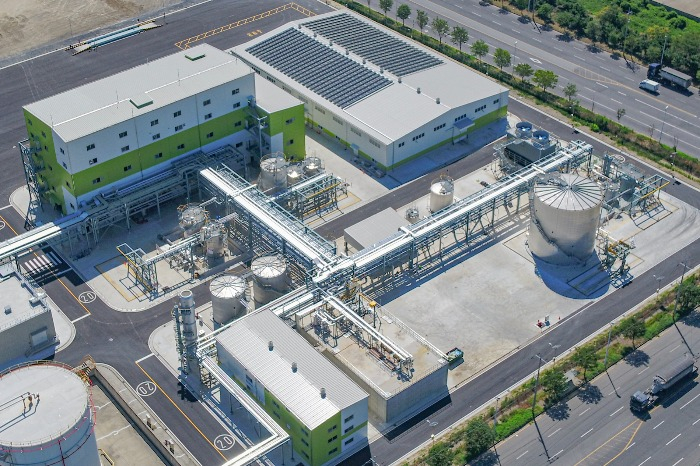Samyang transitions to white biotech with S.Korea’s first isosorbide plant
Samyang Innochem, a joint venture between Samyang and Japan's Mitsubishi, operates an isosorbide plant in Gunsan, North Jeolla province
By Nov 17, 2022 (Gmt+09:00)
Samsung steps up AR race with advanced microdisplay for smart glasses


When in S. Korea, it’s a ritual: Foreigners make stops at CU, GS25, 7-Eleven


Maybe Happy Ending: A robot love story that rewrote Broadway playbook


NPS yet to schedule external manager selection; PE firms’ fundraising woes deepen


US auto parts tariffs take effect; Korea avoids heavy hit



Samyang Group, a diversified conglomerate, has long focused on the chemicals and foodstuffs sectors.
While adding to its existing chemicals businesses that involve engineering plastics with products such as industrial fibers and plastic bottles, the company has recently turned its attention to white biotechnology.
Samyang Innochem Corp., a joint venture between Samyang Holdings and Japan's Mitsubishi Corp., built and operates an isosorbide plant in Gunsan, North Jeolla Province.
Sprawling across a 23,000-square meter footprint, the plant boasts an annual production capacity of 10,000 tons of isosorbide.
Machines inside the four-story factory add catalysts to corn-derived sorbitols, a naturally occurring sugar alcohol found in edible plants.
Isosorbide is a bicyclic chemical compound, and one of the best-known white biotechnology materials.
It can be turned into bio polycarbonate (PC), bio PET and bio polyurethane (PU), among others. These materials have broad applications for making plastics, paint varnishes and adhesives, to name a few.
Samyang Innochem is Korea's only isosorbide manufacturer; the group has been operating in the white biotechnology sector for 13 years.
Starting in 2009, it invested 35 billion won ($26.1 million) spread over six years to secure the technology to commercialize isosorbide, and began building the Gunsan plant in 2015.
Construction was completed this past July and then underwent several months of pilot operation. The company launched commercial production back in February and held its ribbon-cutting this Tuesday.
At the ceremony, Samyang Group Chairman Kim Yoon said, “We will pursue gradual expansion in line with the growth of the white biotechnology market.” He added that the company plans to increase the annual production capacity to 40,000 tons by opening a second plant by 2025.
France’s Roquette, the world's leading isosorbide producer, has an annual production capacity of 20,000 tons.
Write to Seo-Woo Jang at suwu@hankyung.com
Jee Abbey Lee edited this article.
-

-
 Corporate investmentLG Electronics breaks ground on $600 mn home appliance plant in India
Corporate investmentLG Electronics breaks ground on $600 mn home appliance plant in India12 HOURS AGO
-

-
 E-commerceCoupang’s Q1 revenue up; quarterly dip signals rising competition
E-commerceCoupang’s Q1 revenue up; quarterly dip signals rising competitionMay 07, 2025 (Gmt+09:00)
-
 Asset managementKorea Investment & Securities deepens global ties with 2nd IR in New York
Asset managementKorea Investment & Securities deepens global ties with 2nd IR in New YorkMay 07, 2025 (Gmt+09:00)


